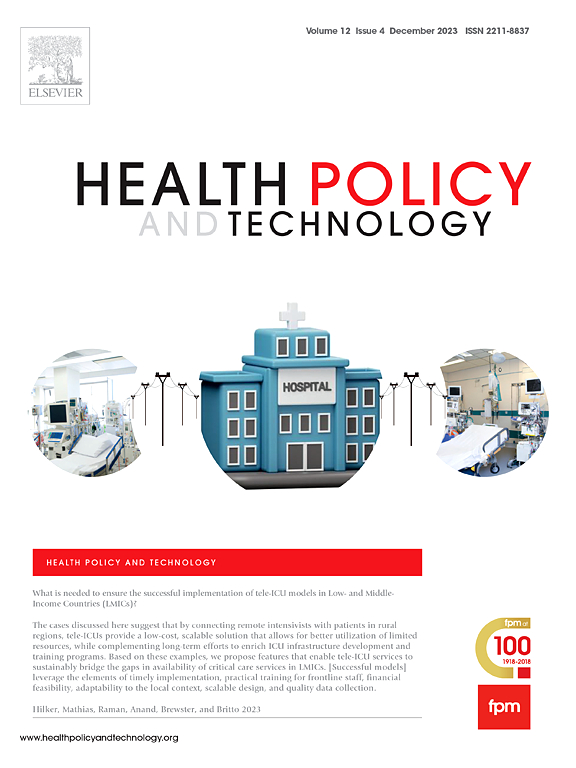检查个人电子健康素养对移动健康应用程序继续意向的影响:基于tam的方法
IF 3.7
3区 医学
Q1 HEALTH POLICY & SERVICES
引用次数: 0
摘要
目的移动医疗应用(MHAs)在现代医疗服务中发挥着关键作用,但了解影响用户继续使用这些平台意愿的因素仍然是一个关键的研究领域。本研究以技术接受模型(TAM)为理论框架,探讨感知电子健康素养(PEHL)对用户信任、感知有用性和感知易用性的影响。方法采用结构方程模型对尼日利亚430名参与者的数据进行评价。这种方法有助于全面评估感知电子卫生素养、感知有用性、感知易用性、信任和mha的持续意图之间的复杂相互关系。通过在此框架内应用统计分析,本研究旨在对数据进行严格检查并提取重要发现。结果通过对MHAs用户的调查,路径分析揭示了PEHL与信任、感知有用性和感知易用性之间的显著正相关,强调了个人能力在塑造数字卫生资源观点方面的重要性。此外,在PEHL和用户继续使用mha的意愿之间的关系中,信任是一个关键的中介,突出了它在促进与这些平台的持续接触方面的关键作用。研究结果强调了信任在促进与mha的持续接触方面的关键作用。结果表明,提高用户的电子健康素养可以积极影响他们对有用性和易用性的信任和看法,这反过来可以推动他们继续使用这些应用程序的意愿。结论本研究促进了电子医疗文献的理论进步,并为mha的设计和实施提供了实践见解,以提高用户对数字医疗生态系统的接受度和参与度。PEHL、信任和继续使用意愿之间的正相关关系强调了提高用户能力和信任的战略的必要性,以确保mha的持续使用。本文章由计算机程序翻译,如有差异,请以英文原文为准。
Examining the influence of personal eHealth literacy on continuance intention towards mobile health applications: A TAM-based approach
Objectives
Mobile health applications (MHAs) play a key role in modern healthcare delivery, yet understanding the factors influencing users' continuance intention towards these platforms remains a critical area of inquiry. This study investigates the influence of perceived e-Health literacy (PEHL) on users' trust, perceived usefulness, and perceived ease of use of MHAs, employing the Technology Acceptance Model (TAM) as a theoretical framework.
Methods
Structural equation modeling was employed to evaluate data collected from 430 participants in Nigeria. This approach facilitated a thorough assessment of the complex interconnections among Perceived e-health literacy, Perceived usefulness, perceived ease of use, trust, and Continuance intention of MHAs. Through the application of statistical analyses within this framework, the study aimed to offer a rigorous examination of the data and extract significant findings.
Results
Through this survey of MHAs users, path analysis reveals significant positive associations between PEHL and trust, perceived usefulness, and perceived ease of use, underscoring importance regarding individual competencies with shaping views of digital health resources. Moreover, trust emerges as a key mediator in the relationship between PEHL and users' continuance intention to use MHAs, highlighting its pivotal role in fostering sustained engagement with these platforms.
Discussion
The findings highlight the pivotal role of trust in fostering sustained engagement with MHAs. The results suggest that enhancing users' eHealth literacy can positively influence their trust and perceptions of usefulness and ease of use, which in turn can drive their intention to continue using these applications.
Conclusions
The study contributes to theoretical advancements in eHealth literature and offers practical insights for the design and implementation of MHAs to enhance user acceptance and engagement in digital healthcare ecosystems. The positive associations identified between PEHL, trust, and continuance intention underscore the need for strategies that enhance users' competencies and trust to ensure sustained use of MHAs.
求助全文
通过发布文献求助,成功后即可免费获取论文全文。
去求助
来源期刊

Health Policy and Technology
Medicine-Health Policy
CiteScore
9.20
自引率
3.30%
发文量
78
审稿时长
88 days
期刊介绍:
Health Policy and Technology (HPT), is the official journal of the Fellowship of Postgraduate Medicine (FPM), a cross-disciplinary journal, which focuses on past, present and future health policy and the role of technology in clinical and non-clinical national and international health environments.
HPT provides a further excellent way for the FPM to continue to make important national and international contributions to development of policy and practice within medicine and related disciplines. The aim of HPT is to publish relevant, timely and accessible articles and commentaries to support policy-makers, health professionals, health technology providers, patient groups and academia interested in health policy and technology.
Topics covered by HPT will include:
- Health technology, including drug discovery, diagnostics, medicines, devices, therapeutic delivery and eHealth systems
- Cross-national comparisons on health policy using evidence-based approaches
- National studies on health policy to determine the outcomes of technology-driven initiatives
- Cross-border eHealth including health tourism
- The digital divide in mobility, access and affordability of healthcare
- Health technology assessment (HTA) methods and tools for evaluating the effectiveness of clinical and non-clinical health technologies
- Health and eHealth indicators and benchmarks (measure/metrics) for understanding the adoption and diffusion of health technologies
- Health and eHealth models and frameworks to support policy-makers and other stakeholders in decision-making
- Stakeholder engagement with health technologies (clinical and patient/citizen buy-in)
- Regulation and health economics
 求助内容:
求助内容: 应助结果提醒方式:
应助结果提醒方式:


